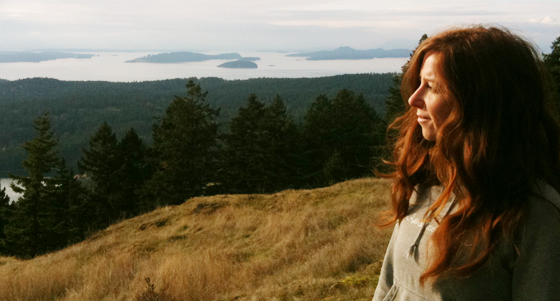 Natalie Baloy is a graduate student in the Department of Anthropology, and is the co-facilitator for a CTLT Aboriginal Initiatives Classroom Climate series session called “More than Content: Working Critically with Fear, Guilt, Privilege, and Other ‘Hidden’ Issues.” This session allows participants to learn more about and discuss classroom conversation topics that may provoke a strong emotional response. CTLT’s Aboriginal Initiatives Classroom Climate series encourages UBC faculty, teaching assistants, researchers, graduate students, and staff to become more critically aware of their assumptions about Aboriginal issues in their teaching and learning practices. Through the series, participants gain skills to create a more clearly developed and informed approach to understanding and teaching Aboriginal and other socially contentious issues in a curricular setting.
Natalie Baloy is a graduate student in the Department of Anthropology, and is the co-facilitator for a CTLT Aboriginal Initiatives Classroom Climate series session called “More than Content: Working Critically with Fear, Guilt, Privilege, and Other ‘Hidden’ Issues.” This session allows participants to learn more about and discuss classroom conversation topics that may provoke a strong emotional response. CTLT’s Aboriginal Initiatives Classroom Climate series encourages UBC faculty, teaching assistants, researchers, graduate students, and staff to become more critically aware of their assumptions about Aboriginal issues in their teaching and learning practices. Through the series, participants gain skills to create a more clearly developed and informed approach to understanding and teaching Aboriginal and other socially contentious issues in a curricular setting.
We recently asked Natalie a few questions about her role at the University and her involvement in the CTLT Aboriginal Initiatives Classroom Climate series. Here’s what she had to say.
Q. Can you please introduce yourself and briefly discuss your role at the University, area of research, and courses you teach?
Natalie Baloy (NB): Raised in a small town in Ohio, I grew up with little knowledge of or exposure to Indigenous peoples and land, and did not engage in critical thinking about the settler colonial project until I went to university in Michigan. As a graduate student in the Department of Anthropology at UBC, I have continued to explore issues related to settler hegemony, race, space, and decolonization. My dissertation examines how non-Aboriginal people in Vancouver relate to Aboriginality: their constructions and definitions of difference, their understandings of land and belonging, and their own roles in efforts toward inclusion, recognition, and decolonization. At UBC I have been a teaching assistant in anthropology and history, a sessional instructor, a facilitator for CTLT’s Instructional Skills Workshop, and the coordinator of the UBC Mix project, which promotes interdisciplinary teaching and learning. I am passionate about learning and critical thinking, and I look forward to teaching more in the future.
Q. What are some of the challenges you face when teaching?
NB: Each classroom brings together a distinct group of students, each of whom brings a range of experiences, preconceived ideas, and ways of speaking, learning, and behaving in class. Some are already attuned to issues of power and privilege and are prepared to engage in critical thinking, while others are just beginning this process. As an instructor or teaching assistant, it can be challenging to attend to their different needs, levels of awareness, and openness to dialogue and critical discussion. It involves being sensitive to where students are, while also pushing them to think deeper, to discuss difficult topics, and to apply course content beyond the classroom.
Q. Can you describe the session you will be leading as part of the series on Classroom Climate?
NB: Dr. Coll Thrush (History) and I lead a session called, “More than Content: Working Critically with Fear, Guilt, Privilege, and Other ‘Hidden’ Issues.” In this session, we suggest that “affect” – emotional responses and reactions – is a core part of the learning process, especially in courses that address issues of injustice, inequality, and power. During the session, we ask participants to list different “species” of affect that emerge in their courses, from anxiety and indifference to excitement and empowerment. Participants discuss the causes and effects of these affective responses, drawing on their teaching experiences. We then collectively identify strategies to respond to emotional moments in our courses, and how to cultivate a classroom climate built on acknowledging – and appreciating – the affective dimensions of learning.
Q. Why do you think it is important for TA’s, researchers, faculty, and staff to attend this series?
NB: The Classroom Climate Series provides teaching assistants, researchers, faculty, and staff with a space to reflect on learning environments at UBC and an opportunity to discuss how to transform them into dynamic and responsive sites of inquiry, exchange, and dialogue. The series is relevant for all UBC instructors, regardless of their course content, because it speaks to broad issues of critical pedagogies, respect in the classroom, and practicing an ethic of care and social responsibility in our courses.
Q. What do you hope this series will do?
NB: I hope the series will help participants to explore their own affective processes of teaching and learning, to develop strategies for addressing critical issues and difficult classroom dynamics, and to galvanize their commitment to engaged, transformative, and student-centred teaching. I also hope that this process inspires learning that extends beyond the classroom, building greater respect, awareness, empathy, and social and political engagement.
This article was published in the July 2013 CTLT Newsletter, Dialogues. Below is a list of the articles included in the issue:
- Join us for the CTLT Summer Institute!
- Flipped Lab: Examining What Works in a Flipped Classroom
- Truth and Reconciliation at UBC: Confronting Our Legacies
- Connect Research Project: Results of An Innovative Study on User Experience
- Connecting Communities of Practice at UBC
- Facilitator Spotlight: Natalie Baloy (currently viewing)
Find out more information about the CTLT Newsletter, Dialogues.